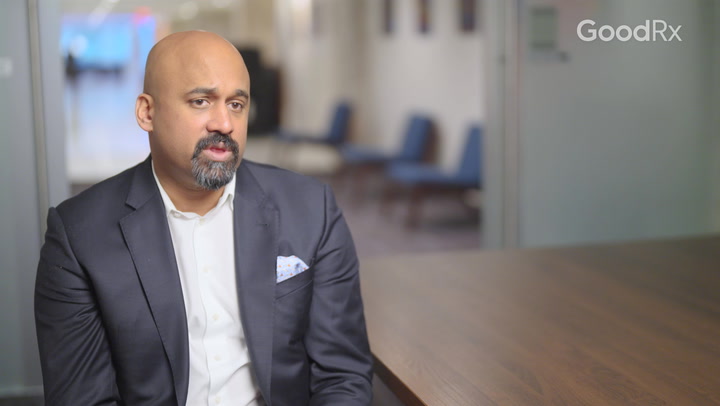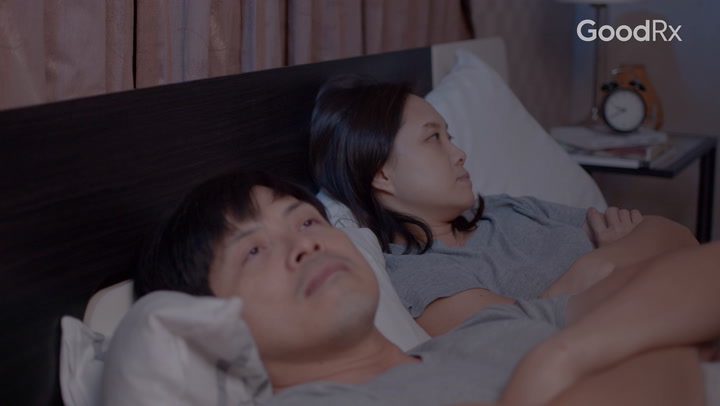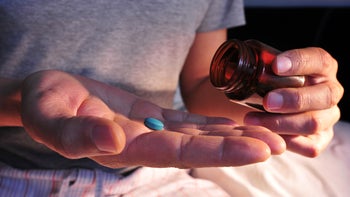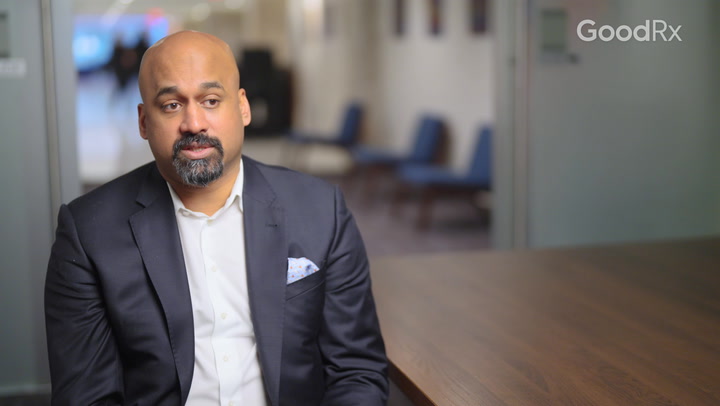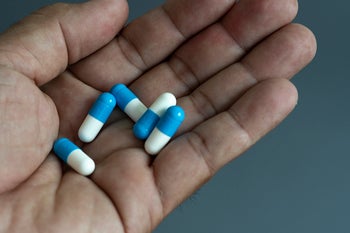
Can an Enlarged Prostate Affect Your Sex Life? Erectile Dysfunction, Orgasms, and More
Key takeaways:
On its own, having an enlarged prostate (known as benign prostatic hyperplasia, or BPH) doesn’t cause problems with sexual function.
Many treatments for BPH do cause sexual problems, though, like trouble with erection and ejaculation and changes in libido.
There’s no evidence that having frequent ejaculations can shrink your prostate.
Access savings on related medications
Table of contents

The prostate is one of those organs that go unnoticed for men until there’s an issue. This is a problem, given how important it is for sexual health.
The prostate plays a key role in ejaculation, which helps sperm fertilize an egg during reproduction. And it also sits very close to nerves and blood vessels that feed the penis. That means any targeted treatment for an enlarged prostate, or benign prostatic hyperplasia (BPH), as it’s known in medical terms, may affect sexual function too.
Here, we’ll talk about how BPH is related to erectile dysfunction (ED), changes in your sex drive, and ejaculation problems. We’ll also dive into what treatment choices you have if ED is an issue for you.
ED treatment on your terms
Build a personalized treatment plan and get erectile meds delivered discreetly. Subscriptions start at just $18/mo.

GoodRx is NOT insurance. Cancel anytime. GoodRx Health information and resources are reviewed by our editorial staff with medical and healthcare policy and pricing experience. See our editorial policy for more detail. We also provide access to services offered by GoodRx and our partners when we think these services might be useful to our visitors. We may receive compensation when a user decides to leverage these services, but making them available does not influence the medical content our editorial staff provides.
What is the function of the prostate gland?
The prostate is part of the male reproductive system. It’s located inside your body, near the base of your penis. Your prostate gland’s main function is to make fluid for semen (cum). During ejaculation, the muscles in your prostate also contract and help semen exit your body.
Enlarged prostate symptoms
Having an enlarged prostate or BPH doesn’t typically affect sexual function. But it commonly leads to lower urinary tract symptoms, like:
Having a sudden urge to urinate (pee)
Being unable to form a full stream
Feeling as if urine is trapped in your bladder
During a man’s lifetime, the prostate goes through two major growth spurts: one during puberty and another around 50 or 60 years of age. This second phase of prostate growth can lead to an enlarged prostate. Having an enlarged prostate is common. It’s estimated that half of men will have some form of BPH in their 50s — and that number increases with age.
Can an enlarged prostate cause erectile dysfunction (ED)?
No, an enlarged prostate hasn’t been shown to be a direct cause of ED. The prostate is an important organ for male sexual function. But BPH is more of a urination issue than a sexual one.
And, usually, an enlarged prostate isn’t much of a problem, unless symptoms become burdensome and treatment is needed.
An enlarged prostate, or benign prostatic hyperplasia (BPH), can impact your quality of life. Here’s a list of medications that can help get BPH under control.
The older you are, the more likely you are to have an enlarged prostate. Learn more about what causes an enlarged prostate, its symptoms, and treatment options.
Erectile dysfunction (ED) isn’t always a lifelong diagnosis. Check out our list of curable causes of ED and their treatments.
But that’s where concerns about ED come in. To treat BPH, you have two choices:
Medications that relax the prostate or stop it from getting bigger
Surgery
Alpha blockers like Flomax are common medications used to treat BPH. Alpha blockers cause the blood vessels in the prostate to narrow. This relaxes the muscles in the prostate and makes it easier to urinate. But one possible side effect is less blood flow into the penis during an erection, which could lead to ED.
Another medication used for BPH is Avodart. It’s an anti-testosterone medication that stops the prostate from growing. However, lower testosterone levels in the body may cause ED as well.
Lastly, surgical procedures can also cause ED by damaging structures around the penis, which we’ll discuss below.
Can an enlarged prostate keep you from ejaculating?
No. On its own, an enlarged prostate won’t affect your ability to ejaculate. But here’s the catch: Many medications and treatments for BPH do have side effects that keep you from ejaculating. These include:
Retrograde ejaculation: When you have an orgasm, you typically ejaculate semen out of the end of your penis. Retrograde ejaculation is when some, or all, of the semen goes into your bladder instead.
Inability to ejaculate: This is when you have an orgasm, but your body doesn’t ejaculate semen at all.
These are both sometimes called “dry” orgasms. Though they’re not dangerous, dry orgasms can feel different from what you’re used to, which can be unsettling. They can also affect your fertility, as it’s harder to start a pregnancy if little — or no — semen comes out of your penis during sex.
Does an enlarged prostate (BPH) lower sexual desire?
No. Having an enlarged prostate won’t make you less interested in sex. But, if you’re taking a 5-alpha reductase inhibitor, these medications can lower your sex drive. Common examples are:
Avodart (dutasteride)
Proscar (finasteride)
These medications work by blocking testosterone from changing into dihydrotestosterone (DHT) in your body. This can help your prostate get smaller. But having lower amounts of DHT can lower your libido too.
Does sex help prevent prostate enlargement?
Probably not. So far, there’s no clear evidence that having sex often can help shrink your prostate. It’s likely that your age has more of an effect on your prostate health than your sex life.
One study looked at about 2,000 men with prostate enlargement. It found that — after the researchers took age into consideration — ejaculation frequency didn’t have any effect on prostate size.
Can I prevent ED after prostate surgery?
A simple prostatectomy is a surgery removing part of the prostate to make it smaller and help improve your BPH symptoms. These days, many prostatectomies use nerve-sparing techniques to lower the chances of injury to the tissue and prevent ED. Both can still happen though.
Several other treatments are available for men after prostate surgery to help them regain erectile function and prevent ED.
One option is called “penile rehabilitation,” which uses techniques to help improve blood flow into the penis. This may include the use of therapies like:
Sildenafil (Viagra)
Penile injections (like Edex or Caverject)
Vacuum erection devices
Current research on the benefits of this intervention is limited. Still, it’s recommended that men proceed with their usual sexual habits after healing, as it may help prevent long-term issues. They should also use medications to improve blood flow and erections.
I have ED after getting prostate surgery. What now?
For treating ED after prostate surgery, first-choice therapies include medications like:
Research has shown that these medications help improve erectile function. They do this by relaxing the blood vessels that supply the penis, so more blood can flow through.
These medications might not work right after surgery though. One reason for that is that blood may not flow easily through blood vessels that are still healing. But after the blood vessels have healed enough, medication is likely to help with ED. In fact, up to 75% of men with ED after nerve-sparing surgery respond to Viagra. However, this may take anywhere from weeks to years.
In some people, Viagra, Cialis, or Levitra may not work. Or these medications might not be an option due to other issues (like a drug interaction). In these cases, an injection may be used instead. The good news is that there are options if you have ED and can’t take Viagra.
Frequently asked questions
No, there’s no link between the amount of sexual activity and prostate size or urine flow. Prostate enlargement is a normal change that happens as you age.
Yes, ejaculation can raise your levels of prostate specific antigen (PSA) in the short term. PSA is a protein made by your prostate. When PSA levels are high, it can be a sign of a condition like prostate cancer.
Healthcare professionals typically recommend abstaining from ejaculation for about 48 hours before having a PSA level checked. Other activities like vigorous exercise, cycling, and prostate biopsies can also raise your PSA temporarily.
There’s some limited evidence that prostate massage may help with lower urinary tract symptoms caused by an enlarged prostate. Some people who use therapeutic massage report improvement of some symptoms.
More research is needed though. Therapeutic massage isn’t currently included in the American Urological Association guidelines for treatment of BPH.
Quiz: Is it erectile dysfunction?
The bottom line
If you have an enlarged prostate, you may be worried if it’ll affect your sex life. The good news is that it won’t, on its own. Having a large prostate doesn’t directly cause erection, ejaculation, or libido problems.
But keep in mind: Many prostate medications and surgeries can have a major effect on your sexual function. That’s why if you’re being treated for an enlarged prostate, it’s a great idea to talk to a healthcare professional about any sexual concerns. They can help you understand how your treatment(s) might affect your sex life. And they can also work with you to find a way to manage any issues that come up.
Why trust our experts?



References
Anawalt, B. D. (2017). Is dihydrotestosterone a classic hormone? Endocrine Reviews.
Capodice, J. L., et al. (2009). Evaluation of an at-home-use prostate massage device for men with lower urinary tract symptoms. The Open Urology & Nephrology Journal.
Gandhi, J., et al. (2017). The impact and management of sexual dysfunction secondary to pharmacological therapy of benign prostatic hyperplasia. Translational Andrology and Urology.
Jacobsen, S. J., et al. (2003). Frequency of sexual activity and prostatic health: Fact or fairy tale? Urology.
MacMillan Cancer Support. (2021). The prostate.
MedlinePlus. (2023). Simple prostatectomy.
Montorsi, F., et al. (2005). Efficacy of sildenafil citrate in men with erectile dysfunction following radical prostatectomy: A systematic review of clinical data. The Journal of Sexual Medicine.
National Cancer Institute. (2025). Prostate-specific antigen (PSA) test. National Institute of Health.
Ng, M., et al. (2024). Benign prostatic hyperplasia. StatPearls.
Prostate Cancer Foundation. (n.d.). The prostate gland.
Sandhu, J. S., et al. (2023). Management of lower urinary tract symptoms attributed to benign prostatic hyperplasia: AUA guideline. American Urological Association.
Urology Care Foundation. (2023). What is benign prostatic hyperplasia (BPH)?



